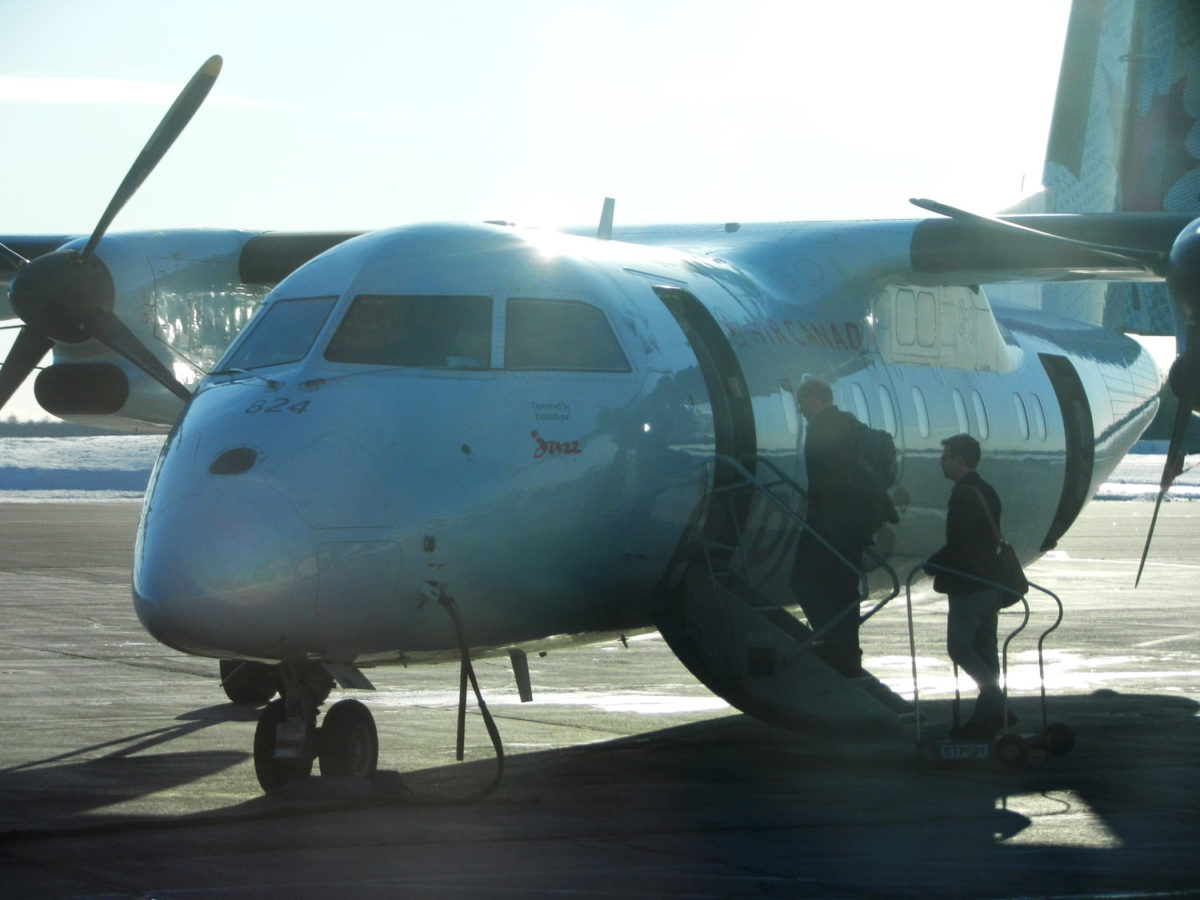
His arms reveal his sons’ names in thick black cursive, Andrew on the right and Thomas on the left. His quiet, petite wife has one boy in her arms and he’s holding the other.
He settles one of the two squirmy blonde-haired, blue-eyed 13-month-old twin boys into a highchair. He tosses a handful of cheerios on the tray to occupy him. He and his wife order beer from the waitress at the Tide and Boar pub in downtown Moncton. They both appear glad to be sitting down.
Spending time with his family is a novelty Grant Finlayson doesn’t take lightly. Like many New Brunswickers, Finlayson works outside the province. Working as an electrician in Fort Mackay, Alberta, he has been making the 5,400-kilometer trip for a year and a half, and sees his wife and sons every three weeks.
“I’ve been in Moncton most of my life. Unfortunately, Moncton doesn’t have a lot of work right now. So, I decided to go the route of working out west.”
New Brunswick Premier David Alward told MLAs just last year that nearly 15,000 people from New Brunswick work outside the province in the natural resource sector alone – including his own son, who works as a pipefitter in Kearl Lake, Alberta.
Though the Finlayson’s paint a picture of what thousands of families throughout the province have to go through, many say the good outweighs the bad.
“There’s all kinds of opportunities and people are too set on the negative and will complain, complain, complain about how difficult it is and they don’t look at the positives- and they far out weight the negatives,” says Finlayson.
Living out west
Finlayson’s wife, Jannet wears black glasses and no visible makeup. Her long light brown hair is suitable entertainment for a little boy to tug on. Jannet works from their home in Hillsborough, just outside of the city.
Finlayson lives in a camp just 31 kilometers north of Fort McMurray with an assortment of other trades workers and engineers. The camp houses now 3,500 men under one roof.
The heavily populated living quarters are one reason camp life takes some getting used to. Another is the food.
“The food there is decent. Some camps are better than others. They’ve got a big mess hall. They try to keep the food somewhat edible so that the guys are happy.”
Finlayson makes $50 an hour plus overtime every day for up to 28 days in a row.
“We aren’t there for the job, we are there for the money,” says Finlayson.
Speaking with Finlayson is like speaking to my own father. For nearly 20 years my dad has worked and lived all over the country including Edmonton, Iqaluit, Newfoundland and parts of British Columbia in order to provide a decent standard of living for my family. Naturally, being woken up well past my bedtime was a normal occurrence when I was growing up, in order to talk to my dad.
Finlayson says the distance between him and his sons is the hardest part of being away, but it’s made a lot easier through Skype. However, with the four-hour time difference, his sons are already in bed when he comes back from work.
“But there’s texting and I get pictures all the time.”
Finlayson says he couldn’t imagine dealing with the same situation 10 years ago without technology.
For the family
Finlayson says the increase in income has given his family more choices they didn’t have before he began working out west.
“My kids now have more opportunities to do what they want to do, we have more opportunity to renovate the house or go on a trip,” says Finlayson.
Not only is there more freedom and flexibility, there are always opportunities to further his career, due to networking.
“You meet so many people, you build new friendships and contacts. Sometimes you get into a position where you meet guys even from your own town and you build a relationship with and I’ve seen guys who have built businesses out of friendships.”
Finlayson is constantly adapting to a changing world. He’s attained four separate degrees in order to keep up with an ever changing work environment and it’s something he will continue to do in order to do what’s best for his family.
“It’s what I do best I guess. I adapt to be able to support my family and my lifestyle,” says Finlayson.
“I’m comfortable where I am, what I do and who I am. If in five years I have to turn around and get an engineering degree, I’ll go get an engineering degree. So, I can do what I have to do to make sure that my family is well taken care of.”
Samantha Dean is a student at St. Thomas. Her father has been working as a heavy equipment operator in Fort McMurray for a year and a half. She says the distance and the work has been positive for her family, especially her parents.
“I think it made my mom and dad’s relationship stronger,” says Dean. “Of course she misses him like crazy and he misses her as well.
“They cherish time together more now and overall the family appreciates that he does this for us.”
As my brother and I got older, the time spent away from our dad went by quicker. My mother now lives with him in Yellowknife, NWT. They are both working on a two-year contract, my mother a project manager and my dad a subcontractor. There’s still a three-hour time difference between them and my brother and I, but the two of them are happier than they’ve been in years.
Story originally posted on Dylan Hackett’s blog
